Landscaping Emerson Park
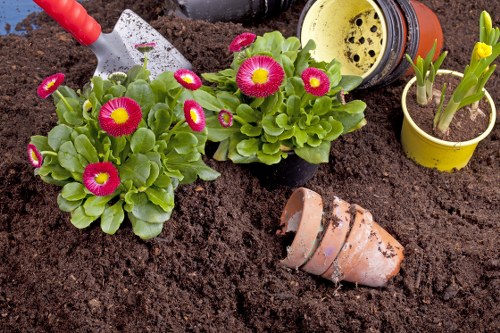
Emerson Park is a vibrant community where beautiful landscapes enhance the living experience. Whether you're a homeowner looking to revamp your garden or a property manager aiming to create inviting outdoor spaces, understanding the fundamentals of landscaping Emerson Park is essential.
Landscaping goes beyond mere aesthetics; it plays a critical role in improving property value, promoting environmental sustainability, and providing a peaceful retreat from the hustle and bustle of daily life. In this article, we'll explore various aspects of landscaping in Emerson Park, offering insights and tips to help you create and maintain stunning outdoor spaces.
Understanding the Climate is the first step in successful landscaping. Emerson Park experiences a temperate climate, which influences the types of plants that will thrive in your garden. Selecting plants that are well-suited to the local weather conditions ensures a lush and resilient landscape.

The Benefits of Landscaping Emerson Park
Investing in landscaping offers numerous benefits, both tangible and intangible. Here are some key advantages:
- Increased Property Value: Well-maintained landscapes can significantly boost the market value of your property.
- Environmental Impact: Proper landscaping can enhance biodiversity, reduce erosion, and improve air quality.
- Energy Efficiency: Strategic placement of trees and shrubs can provide shade, reducing the need for air conditioning in the summer and acting as windbreaks in the winter.
- Enhanced Curb Appeal: A beautiful garden creates a positive first impression, making your home more appealing to visitors and potential buyers.
These benefits highlight why landscaping is a worthwhile investment for both homeowners and the community at large.
Moreover, landscaping fosters a sense of pride and connection to the environment, encouraging residents to engage in outdoor activities and contribute to the neighborhood's overall well-being.
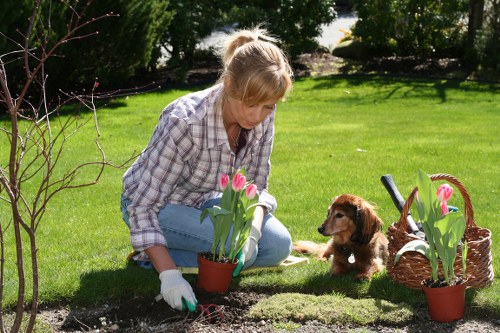
Choosing the Right Plants for Emerson Park’s Climate
Selecting the appropriate plants is crucial for maintaining a healthy and vibrant garden. Here are some plant varieties that thrive in Emerson Park:
- Perennials: Plants like lavender and daylilies come back year after year, providing consistent beauty with minimal maintenance.
- Native Plants: Species native to the region, such as the Eastern Redbud and Black-eyed Susan, are well-adapted to the local climate and require fewer resources.
- Shade-Tolerant Plants: For areas with limited sunlight, consider hostas, ferns, and astilbes.
- Drought-Resistant Plants: Succulents and ornamental grasses like blue fescue can withstand dry periods, making them ideal for water-wise gardens.
When choosing plants, consider factors such as soil type, sunlight exposure, and water availability to ensure optimal growth and sustainability.
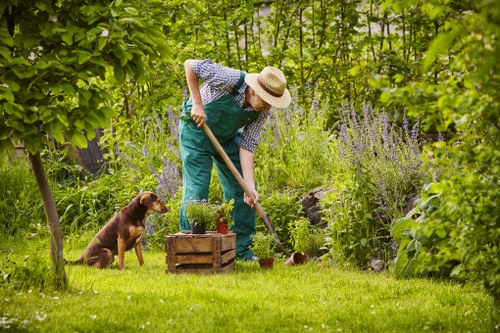
Design Ideas for Residential Landscaping
Creating an appealing landscape involves thoughtful design and planning. Here are some ideas to inspire your Emerson Park garden:
1. **Front Yard Design**
The front yard is the first thing visitors see. Enhance its appeal with a mix of colorful flowers, well-maintained lawns, and ornamental trees. Incorporate pathways and lighting to create a welcoming atmosphere.
2. **Backyard Retreats
Transform your backyard into a private sanctuary with features like patios, pergolas, and water fountains. Use a combination of paved areas and lush greenery to create functional and relaxing spaces.
3. **Low-Maintenance Gardens
If you prefer minimal upkeep, opt for native plants, mulch, and automated irrigation systems. Such designs not only save time but also promote environmental sustainability.
Additionally, incorporating elements like raised beds, vertical gardening, and seating areas can enhance both the functionality and aesthetics of your landscape.
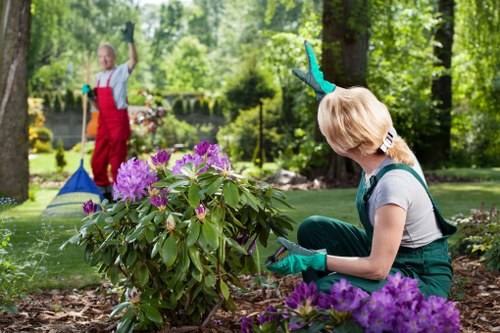
Sustainable Landscaping Practices
Embracing sustainability in your landscaping efforts benefits both your property and the environment. Here are some eco-friendly practices to consider:
- Rainwater Harvesting: Collecting and storing rainwater reduces water consumption and provides a natural source for irrigation.
- Composting: Using organic waste to create compost enriches the soil and minimizes landfill use.
- Native Plant Selection: Native plants require less water and are more resistant to local pests and diseases.
- Energy-Efficient Lighting: Utilizing solar-powered or LED lighting reduces energy usage and lowers utility bills.
Implementing these sustainable practices not only conserves resources but also creates a harmonious balance between your garden and the surrounding ecosystem.
Moreover, sustainable landscaping contributes to the overall health of the community by promoting green spaces and reducing environmental footprints.

Choosing a Landscaping Professional in Emerson Park
Hiring a professional landscaper ensures that your vision becomes a reality. Here are some tips for selecting the right service:
- Experience and Portfolio: Review the landscaper’s previous work to gauge their expertise and style.
- Local Knowledge: A landscaper familiar with Emerson Park will understand the unique climate and soil conditions.
- Services Offered: Ensure they provide the specific services you need, such as design, installation, and maintenance.
- References and Reviews: Check testimonials and seek recommendations to assess their reputation.
- Licensing and Insurance: Verify that the landscaper is properly licensed and insured to protect against potential liabilities.
Choosing the right professional can make the difference between a mediocre garden and a stunning outdoor space.
Investing time in selecting a reputable landscaper ensures quality workmanship and long-term satisfaction with your landscape.
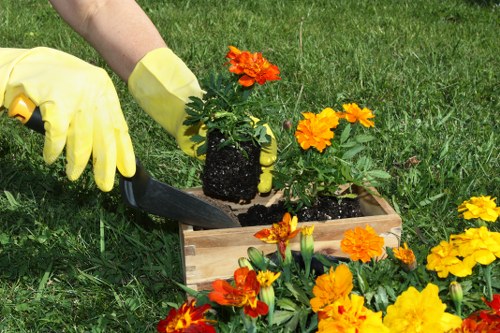
Maintenance Tips for Emerson Park Landscapes
Regular maintenance is key to preserving the beauty and health of your landscape. Here are some essential tips:
1. **Watering Schedule
Establish a consistent watering routine, ensuring that plants receive adequate moisture without overwatering. Early morning is the best time to water to reduce evaporation and prevent disease.
2. **Pruning and Trimming
Regularly prune shrubs and trees to maintain their shape and encourage healthy growth. Remove dead or diseased branches to prevent the spread of pests.
3. **Weeding and Mulching
Keep your garden free of weeds, which compete with plants for nutrients and water. Apply mulch to retain soil moisture, regulate temperature, and suppress weed growth.
4. **Fertilizing
Provide plants with the necessary nutrients by using organic or synthetic fertilizers according to their specific needs.
- Tip: Test your soil periodically to determine its nutrient levels and pH balance.
Implementing these maintenance practices ensures a thriving and vibrant landscape throughout the year.
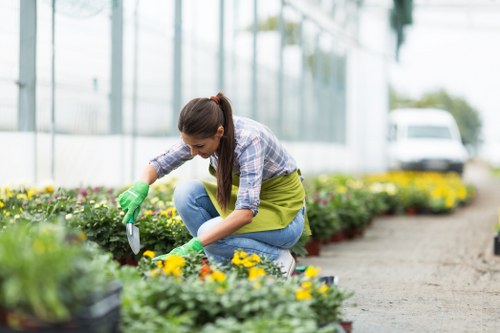
Exploring Nearby Areas to Emerson Park
Emerson Park is surrounded by several charming neighborhoods, each offering unique landscaping features:
- Greenwood: Known for its expansive parks and community gardens, Greenwood is perfect for those who love green spaces.
- Maple Grove: This area features beautifully landscaped streets with mature trees and vibrant flower beds.
- Sunnyvale: Sunnyvale boasts modern landscaping designs with a focus on sustainability and innovative garden structures.
- Riverside: Riverside offers picturesque waterfront gardens and trails, ideal for nature enthusiasts.
- Oakwood: Oakwood is characterized by its historic homes and traditional landscaping styles.
- Lakeside: Lakeside provides serene lakeside gardens and recreational landscaping near the water.
- Pine Hill: This area is famous for its pine trees and rugged, natural garden landscapes.
- Cherry Blossom: Cherry Blossom is renowned for its stunning cherry trees and seasonal floral displays.
- Sunnybrook: Sunnybrook features bright, sunlit gardens with a variety of colorful plants and flowers.
- Willow Creek: Willow Creek offers lush, willow-lined pathways and tranquil garden settings.
Each of these nearby areas contributes to the rich tapestry of landscaping styles and options available to Emerson Park residents.
Exploring these neighborhoods can provide inspiration and ideas for your own landscaping projects.

Enhancing Your Emerson Park Landscape
To take your landscaping to the next level, consider these additional enhancements:
- Outdoor Lighting: Strategically placed lights can highlight architectural features and provide safety during nighttime.
- Water Features: Fountains, ponds, and waterfalls add a soothing sound and visual appeal to your garden.
- Hardscaping Elements: Incorporate pathways, patios, and retaining walls to add structure and functionality.
- Seasonal Planting: Choose plants that bloom in different seasons to ensure your garden looks vibrant year-round.
- Garden Art: Sculptures, birdbaths, and decorative pots can add personality and charm to your landscape.
These enhancements not only beautify your space but also create a more enjoyable and functional outdoor environment.
By thoughtfully integrating these elements, you can craft a landscape that reflects your personal style and meets your lifestyle needs.

Conclusion
Landscaping Emerson Park offers endless possibilities to transform your outdoor space into a beautiful and functional area. From selecting the right plants and designing thoughtful layouts to incorporating sustainable practices and choosing the right professionals, every aspect contributes to the success of your garden.
Embrace the unique climate and characteristics of Emerson Park to create a landscape that not only enhances your property but also fosters a connection with nature. With proper planning and maintenance, your garden can become a source of pride and enjoyment for years to come.
Remember, a well-landscaped garden is a living canvas that evolves with the seasons, offering endless opportunities for creativity and personal expression.
Frequently Asked Questions
1. What are the best plants for Emerson Park’s climate?
Some of the best plants for Emerson Park include native species like Eastern Redbud, Black-eyed Susan, lavender, daylilies, hostas, ferns, succulents, and ornamental grasses such as blue fescue. These plants are well-adapted to the local climate and require minimal maintenance.
2. How can I make my landscape more sustainable?
You can adopt sustainable landscaping practices by harvesting rainwater, composting organic waste, selecting native and drought-resistant plants, using energy-efficient lighting, and implementing mulch to retain soil moisture and suppress weeds.
3. How often should I maintain my landscaped garden?
Regular maintenance is essential for a healthy garden. This includes establishing a consistent watering schedule, pruning and trimming plants as needed, weeding regularly, and fertilizing according to your plants' specific requirements. Seasonal tasks may also be necessary to prepare your garden for different weather conditions.
4. What should I look for when hiring a landscaping professional in Emerson Park?
When hiring a landscaper, consider their experience and portfolio, local knowledge, range of services offered, references and reviews, and ensure they are properly licensed and insured. A reputable professional will understand your vision and have the expertise to bring it to life.
5. How can I increase the curb appeal of my home through landscaping?
Enhance your home's curb appeal by maintaining a tidy lawn, planting colorful flowers, adding ornamental trees and shrubs, incorporating pathways and lighting, and ensuring your front yard is well-organized and inviting. A beautiful front garden creates a positive first impression for visitors and potential buyers.




